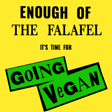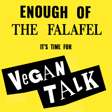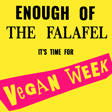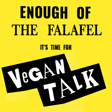
211- Do vegans need to evolve their vocabulary?
Earlier this year the Animal Think Tank released this 'mini guide' suggesting how animal advocates can change their language to better advocate for the change they want to see: https://animalthinktank.org.uk/wp-content/uploads/2025/06/Language-Mini-Guide-2025.pdf
But do words really make a difference? And perhaps more pertinently, what difference might these particular suggested words & phrases make? Richard, Dominic & Ant get stuck into this piece of literature and try to work out what we can learn from it.
As ever, we love hearing your views on the topics under discussion (or anything else!) so do drop us your thoughts via enoughofthefalafel@gmail.com
*************
Enough of the Falafel is a community of people who love keeping on top of the latest news in the world of veganism & animal rights. With the Vegan Talk podcast, we aim to develop listeners' (& our own) thoughts around key issues affecting veganism & the animal rights movement; giving our opinions, whilst staying balanced; remaining true to our vegan ethics, whilst constantly seeking to grow & develop.
Each week we home in on one topic in particular and pick it apart in more detail. If you have a suggestion for a future show, do get in touch via enoughofthefalafel@gmail.com.
*******************
Thanks everyone for listening; give us a rating and drop us a message to say "hi"; it'll make our day!
Dominic, Richard & Anthony



